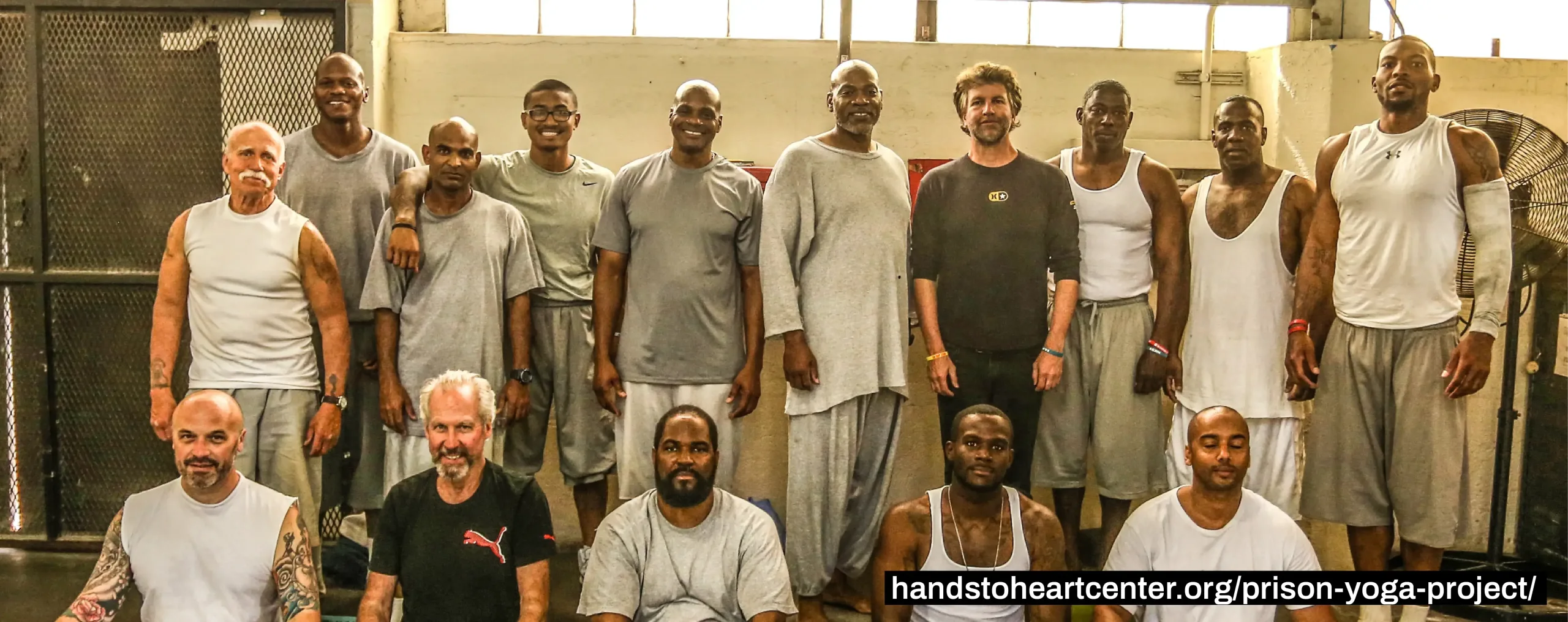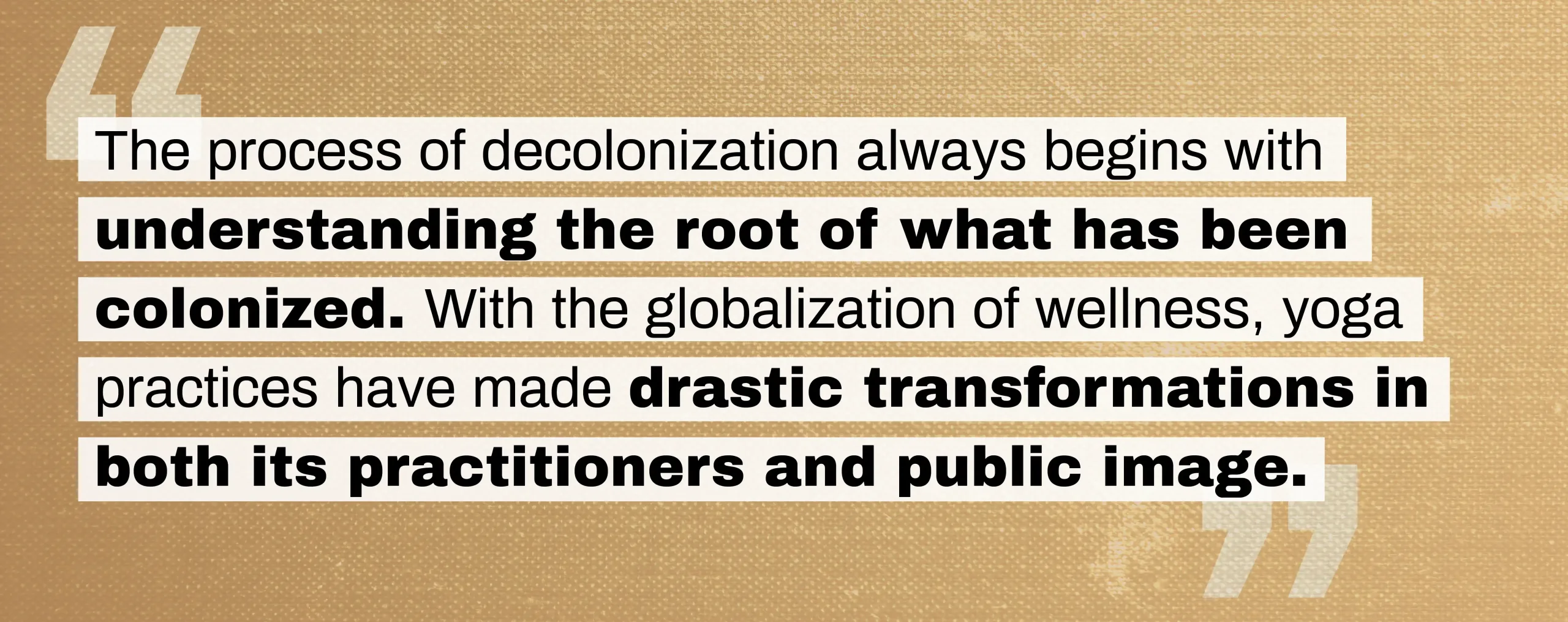In 2002, James Fox began teaching yoga to inmates as part of the rehabilitation program at San Quentin State Prison. He was invited by the prison after having gained a name for himself in teaching yoga to at-risk youth in the Bay Area. Not having a particular model in place at the time, the excitement to share yoga with people who needed it most is what brought his organization Prison Yoga Project (PYP) to life. Since then, PYP has established chapters as far as the East Coast and across the globe. Through the practice of yoga, PYP aims to “promote rehabilitation, reduce recidivism, and improve public safety” by “[reducing] the physical, mental, and emotional impacts and healthcare costs associated with stress and unresolved trauma.” Fox continues to be a decolonizer of wellness with compassion at the forefront.

The process of decolonization always begins with understanding the root of what has been colonized. With the globalization of wellness, yoga practices have made drastic transformations in both its practitioners and public image. One of the most publicly known yoga gurus responsible for the westernization of yoga is Swami Vishnudevananda. Acclimating the ancient properties of yoga to the lifestyle needs of modern men and women, Vishnudevananda is known for synthesizing the expansive 8 Limbs of Yoga, an ancient classical text dating from 400 CE attributed to the ancient sage Patañjali, to more marketable goals. His two books The Complete Illustrated Book of Yoga (1960) and Meditation and Mantras (1978) simplify Patañjali’s writings to digestible terms such as proper exercise, diet, and positive thinking–establishing him as an authority on yoga practices.
While the intention behind these books was to easily train western yoga instructors, a loss of translation seems to have occurred throughout the decades. It is no surprise that yoga has woven itself into the American narrative of healthy competition. As we currently live in an image-based culture, social media posts of perfectly fit Instagram influencers posing in hard-to-achieve inversions is far from healthy. The forced participation in competition aggressively defeats the purpose of yoga completely. Looking to put a stop to this angle and bring yoga back to its core values are many yoga practitioners and influencers. To name a few, here are five decolonizers of yoga.
Yoga is Dead Podcast https://www.yogaisdeadpodcast.com/home
Getting to the root cause of yoga’s globalization, the podcast “Yoga is Dead” unabashedly lets us know who killed yoga. Hosted by Indian-American Tejal Patel and Jesal Parikh, “Yoga is Dead” discusses the overuse of power, privilege, fair pay, harassment, race, cultural appropriation, and capitalism in the yoga and wellness industry.
Prison Yoga Project – Massachusetts Chapter
Expanding from the Prison Yoga Project (PYP) headquarters in California, Harvard professor of public health practice John McDonough trained to become a certified yoga instructor to begin a chapter of PYP in Suffolk County House of Corrections in Boston, where he continues to teach today. McDonough arranges the yoga mats in a circle for his class in order to make yoga a collaborative experience versus a classroom setting.

Naaya Wellness
https://www.naayawellness.com/
Founded by Sinikiwe Dhliwayo after working in the fitness magazine industry and seeing an abundance of whiteness, Naaya Wellness reclaims wellness as a human right. With the mission to “redefine what it looks like and feels like to be well” Naaya serves the BIPOC community with digital salons, workshops, and yoga/mindfulness classes.
Jessamyn Stanley – The Underbelly
“The most intricate and all-consuming yoga doesn’t happen on the mat. It happens in every other part of your life,” says yoga instructor and author Jessamyn Stanley, founder of Underbelly Yoga. Stanley focused the practice of yoga towards self acceptance and body diversity, and gained a huge Instagram following through her posts showing her in yoga poses as a plus-size woman of color, fat femme, and queer femme. Since creating the app The Underbelly, she has also written several books including Yoke: My Yoga of Self Acceptance.
Susanna Barkataki
https://www.susannabarkataki.com/
As an Indian-British immigrant in America, Susanna Barkataki is a yoga instructor and advocate for yoga inclusivity. “I know that yoga is here for us to cultivate power and transcend our limitations, personally and socially,” she says in her mission to decolonize yoga. Her blog covers topics ranging from using yoga for social change to history lessons on the roots of yoga.





